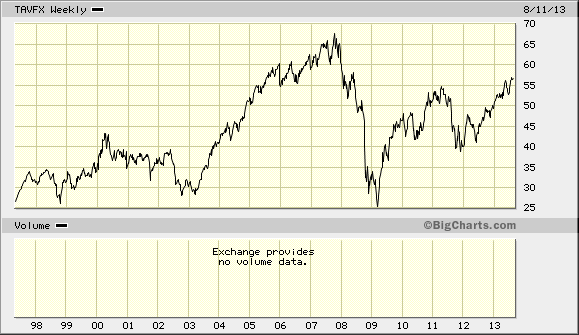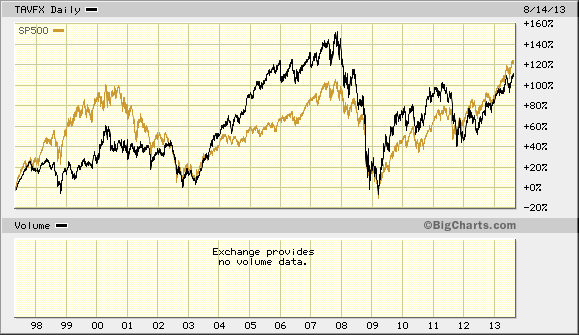https://www.hightail.com/download/bWJvTkZ0WkIzS3JOUjhUQw
and http://www.thirdave.com/ta/
Marty Whitman is an asset based investor who prefers safe and cheap. Unfortunately, the 2008/2009 crash put a dent in his mortgage insurer stocks which turned out to be neither safe nor cheap. Third Avenue Value Fund (TAVFX) tumbled 63% in a year. Humbling.
Vs. S &P 500
http://seekingalpha.com/article/59671-two-value-managers-sweat-out-the-mortgage-insurance-sector
Whitman Takes on Ackman Over Bond Insurers
A respected value investor, Martin Whitman, is going toe-to-toe with another well-known value investor, the hedge fund manager William Ackman, over the future of the bond insurance industry.
Mr. Whitman, founder and co-chief investment officer of Third Avenue Funds, increased his holdings in the two largest bond insurers — MBIA and the Ambac Financial Group — during the fund’s first quarter, which ended Jan. 31. He also increased his stakes in the mortgage insurersMGIC Investment and the Radian Group.
In doing so, Mr. Whitman, has, in effect, put his reputation up against that of Mr. Ackman, whose big bets on share price plunges in the industry have received wide media attention.
There is “much profit to be made in” the bond insurers, whether the companies continue as going concerns or write no new policies and sell off their existing business, in part or in whole, Mr. Whitman said in a letter to fund shareholders.
The 82-year old Mr. Whitman devoted a substantial chunk of the letter to defending his MBIA stake, saying that the company appears to be “very well financed” — a claim William Ackman has disputed vigorously.
Mr. Whitman, who has made a name by buying assets most other investors shun, in January increased his stake in MBIA, the largest bond insurer, at $12.15 a share and now holds about 10 percent of its outstanding shares. Third Avenue also has bought $326 million of the $2.6 billion MBIA has raised in new capital through note sales, which Mr. Whitman said made the company “strongly capitalized.”
“It ought to qualify easily for an AAA rating with a $17 billion claims-paying ability. If so qualified, MBIA would be in a position to underwrite a large amount of profitable new business,” Mr. Whitman wrote in the letter.
But Mr. Whitman noted that among the impediments that might prevent MBIA from winning a stable outlook was the possibility that Mr. Ackman might adversely affect the company.
Mr. Ackman, who has been shorting the bond insurers for some time, has argued that they do not have enough capital to handle a surge in claims.
“MBIA is being victimized by an apparently well-organized bear raid headed by William Ackman of Pershing Square Capital Management,” Mr. Whitman wrote.
Mr. Whitman said that while Mr. Ackman’s bearish views had made it possible to buy MBIA at depressed prices — he noted that the common stock of the four companies has been selling at discounts of about 70 percent from tangible book value — his arguments are “off-base.”
“Ackman believes the bond insurer model does not work because the insureds are able to buy an AAA rating so cheaply,” Mr. Whitman wrote. “The facts are that bond insurance is one of the more profitable P&C businesses.”
Mr. Whitman has proven a master at turning debt bought at distressed prices into something far higher value. For example, he paid about $10 a share for Sears Holdings, some of which he later sold at more than $130 a share and higher.
–
MBIA activities http://en.wikipedia.org/wiki/Bill_Ackman
In 2002, Ackman began research which concentrated on challenging MBIA‘s AAA rating, despite an ongoing probe of his trading by New York State and federal authorities. He was charged copying fees for copying 725,000 pages of statements regarding the financial services company, in his law firm’s compliance with a subpoena.[6] Ackman has called for a division between MBIA’s bond insurers’ structured finance business and their municipal bond insurance side, despite statements from the insurance companies that this would not be a viable option.[7]
He argued that the billions of dollars of CDS protection MBIA had sold against various mortgage backed CDOs was going to be a problem. He also argued that it was not proper for MBIA, which was legally restricted from trading in CDS, to instead do it through a second corporation, LaCrosse Financial Products, which MBIA described as an “orphaned transformer”. Ackman bought credit default swaps against MBIA corporate debt as a way to bet that it would crash. When MBIA did, in fact, crash as the financial crisis of 2008 came to a head, he sold the swaps for a large profit. Ackman reportedly attempted to warn regulators, rating agencies and investors about the bond insurers’ high risk business models. The story of Ackman’s battle with MBIA was turned into a book called Confidence Game (Wiley, 2010) by Bloomberg News reporter Christine Richard.[8] He reported covering his short position on MBIA on January 16, 2009 according to the 13D filed with the SEC.[9]
—
Bill Ackman is a “slick salesman who does not know much about insurance and certainly doesn’t know much about restructuring secure debt”
If you said Carl Icahn you are incorrect.
The previous statement was made by Mr. Martin Whitman – octogenarian and Chairman of Third Avenue Funds Inc.
During the financial crisis, Bill Ackman was short MBIA. Mr. Whitman took a large long position in MBIA and Ambac after the stocks dropped in the crisis and after Mr. Ackman revealed his short. Not only was Mr. Whitman determined to state that MBIA was worth $35 per share, but he also made particular efforts to insult Mr. Ackman’s research efforts and intelligence.
This article on Dealbook summarizes some of Mr. Whitman’s arguments.
What can we learn from this history?
1) Both parties were convinced they were correct.
2) Both parties took significant stakes in the company in question/backed-up their trades.
3) In the end, only Mr. Ackman was left standing.
http://seekingalpha.com/article/1187521-ackman-v-icahn-dont-forget-whitman
CSInvesting: So what are the lessons for us, the mortal, individual investors?
- First, anyone and everyone can err. Don’t rely on a guru. Do your own work.
- Second, financial firms can be laden with unforeseen risks based on their dependence on outside capital and ratings.
- Third, Mr. Whitman underestimated the amount of bad debt and the quality of the assets that the mortgage insurers insured. Knowledge of the Austrian Business Cycle Theory might have helped.
- Ackman challenged the conventional wisdom and saw the flaw in the ratings game.
I hope you study this case further. Ackman wrote a book about MBIA, The Confidence Game. Read more: http://brontecapital.blogspot.com/2010/07/confidence-game-commentary-on-ackman.html
More Classics: Paths to Wealth https://www.hightail.com/download/bWJvTkZ0WkJtUUVVV01UQw
100 Minds https://www.hightail.com/download/bWJvTkZ0WkJEbUlQWWNUQw




3 responses to “Marty Whitman Classic, Devastating Losses, and More Classics”